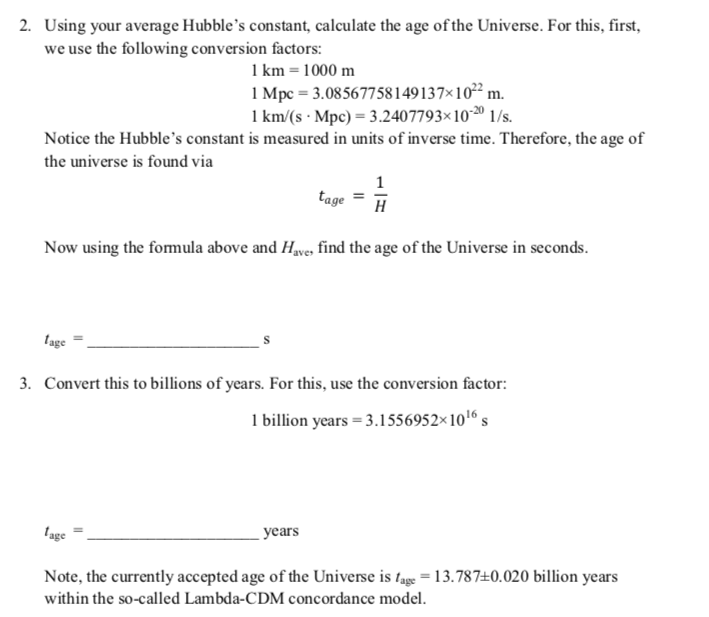2. Using your average Hubble's constant, calculate the age of the Universe. For this, first, we use the following conversion factors: 1 km =1000 m 1 Mpc = 3.08567758149137×10²² m. 1 km/(s · Mpc) = 3.2407793×10*" 1/s. Notice the Hubble's constant is measured in units of inverse time. Therefore, the age of the universe is found via 1 tage Now using the formula above and Hve, find the age of the Universe in seconds. fage 3. Convert this to billions of years. For this, use the conversion factor: 1 billion years = 3.1556952×10' s Iage уears
2. Using your average Hubble's constant, calculate the age of the Universe. For this, first, we use the following conversion factors: 1 km =1000 m 1 Mpc = 3.08567758149137×10²² m. 1 km/(s · Mpc) = 3.2407793×10*" 1/s. Notice the Hubble's constant is measured in units of inverse time. Therefore, the age of the universe is found via 1 tage Now using the formula above and Hve, find the age of the Universe in seconds. fage 3. Convert this to billions of years. For this, use the conversion factor: 1 billion years = 3.1556952×10' s Iage уears
Horizons: Exploring the Universe (MindTap Course List)
14th Edition
ISBN:9781305960961
Author:Michael A. Seeds, Dana Backman
Publisher:Michael A. Seeds, Dana Backman
Chapter13: Galaxies: Normal And Active
Section: Chapter Questions
Problem 6P
Related questions
Question
Questions 2 and 3 please! (they go together)
My Average Hubbles Constant = 71.0 km / (s x Mpc)

Transcribed Image Text:2. Using your average Hubble's constant, calculate the age of the Universe. For this, first,
we use the following conversion factors:
1 km = 1000 m
1 Mpc = 3.08567758149137×10² m.
1 km/(s · Mpc) = 3.2407793×102º 1/s.
Notice the Hubble's constant is measured in units of inverse time. Therefore, the age of
the universe is found via
tage
H
Now using the fomula above and Hve, find the age of the Universe in seconds.
lage
3. Convert this to billions of years. For this, use the conversion factor:
1 billion years = 3.1556952×1016 s
lage
уears
Note, the currently accepted age of the Universe is tage = 13.787±0.020 billion years
within the so-called Lambda-CDM concordance model.
Expert Solution
This question has been solved!
Explore an expertly crafted, step-by-step solution for a thorough understanding of key concepts.
This is a popular solution!
Trending now
This is a popular solution!
Step by step
Solved in 2 steps

Knowledge Booster
Learn more about
Need a deep-dive on the concept behind this application? Look no further. Learn more about this topic, physics and related others by exploring similar questions and additional content below.Recommended textbooks for you

Horizons: Exploring the Universe (MindTap Course …
Physics
ISBN:
9781305960961
Author:
Michael A. Seeds, Dana Backman
Publisher:
Cengage Learning

College Physics
Physics
ISBN:
9781305952300
Author:
Raymond A. Serway, Chris Vuille
Publisher:
Cengage Learning

College Physics
Physics
ISBN:
9781285737027
Author:
Raymond A. Serway, Chris Vuille
Publisher:
Cengage Learning

Horizons: Exploring the Universe (MindTap Course …
Physics
ISBN:
9781305960961
Author:
Michael A. Seeds, Dana Backman
Publisher:
Cengage Learning

College Physics
Physics
ISBN:
9781305952300
Author:
Raymond A. Serway, Chris Vuille
Publisher:
Cengage Learning

College Physics
Physics
ISBN:
9781285737027
Author:
Raymond A. Serway, Chris Vuille
Publisher:
Cengage Learning

College Physics
Physics
ISBN:
9781938168000
Author:
Paul Peter Urone, Roger Hinrichs
Publisher:
OpenStax College

An Introduction to Physical Science
Physics
ISBN:
9781305079137
Author:
James Shipman, Jerry D. Wilson, Charles A. Higgins, Omar Torres
Publisher:
Cengage Learning